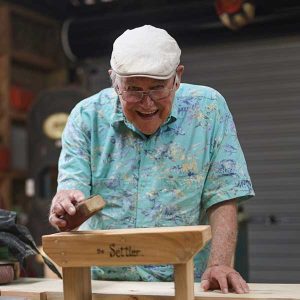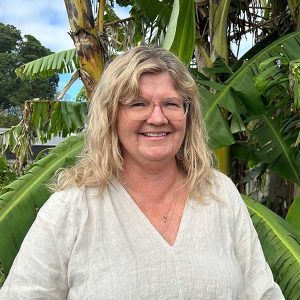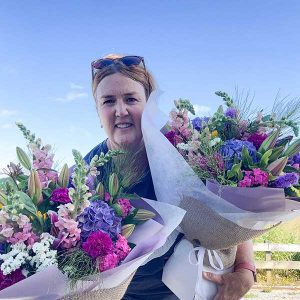Ngā Tāngata o Te Hiku o Te Ika
This is where we celebrate the people of Te Hiku o te Ika – the Far North. From kaumātua to community champions, storytellers to shearers, these are the stories that make our place what it is.

For my 10th birthday, during the end of the Second World War, in 1945, my mother asked me what I wanted for my birthday cake and I said a battleship. So she made me just that. She asked if I wanted a birthday party, and I said oh yes. For the birthday party, she took me up to just below the airport where there was a lovely grove of taraire trees. We played cops and robbers, tag, and all the rest of it on the crunchy leaves. I remember it so vividly.
During the war, when NZ was under threat from the Japanese, because our school [Oturu Primary] was very close to some military installations, we had a practice every week to keep ourselves safe in the event of an invasion. When the teacher said ‘run,’ we had to run and get into a six-foot deep slip trench, and you had to run fast. That was scary stuff. I can still remember the smell of the damp soil, and the teacher would leave us there for 10 or 15 minutes. It was a very different time.
I had a very happy childhood. Most days were very enjoyable. I had very good parents. My mother had the biggest influence on me when I was younger. She was an ex-matron from Waiuku Hospital but had to give up her career when she married my father, who was a widower. She had more energy than my father, who I guess had already had his first family and perhaps wasn’t as interested in the second edition. A loving, caring, and charitable person my mother was. She taught my brother and me lots of domestic skills—cooking, ironing, and cleaning. She certainly taught me a love of books and reading, which went on to be very important in my life. Being charitable, I think, was one of the best things I learned from her. She was always inclined to help others, and I think a bit of that rubbed off on me.
I’d say to young me, go back to the start because it’s going to happen so rapidly in front of you. I’d also say travel isn’t the only way to garner your understanding of the world. Knowing your neighbours is just as important. Get to know the world around you. We had a rich community back then; people shared and cared, and everyone was interwoven. I think it is important to continue your relationship with your community. Don’t forget those friends you had in the beginning, keep with them. Keep your relationships going, they’re very important. It's something I wish I did more of.
I wouldn’t call myself a passionate person, but a person that maintains a compendium of interests. The things that I most enjoy in life are human connections, having people around to meet and greet and talk to and entertain. The real stuff in life is in amongst the interactions with people.
My wife and I bought this bit of dirt in 1972 and turned a whole lot of gorse into a farm. My wife and I made a bloody good team and had a wonderful marriage. It’s almost five years since she passed now. I saw some past students the other day who told me Mrs. Shepherd was the best teacher they ever had. I said they were indeed lucky because she was a very good teacher. But she was also a wonderful mother and a great wife as well. I regret very much that we’ve had five years without her because we would’ve had a pretty good five years, I think. I doubt time will ever change that feeling.
Community development has always been something I’m committed to and interested in. The coalition of cooperative people on a committee or a board has always fascinated me—how the dynamics work and how decisions end up being made. I’ve spent half my life on committees, most of which have been for the benefit of the community, like one that resulted in the building of Te Ahu Centre.
In life, you get dealt cards that you’re not able to control the dealing of. I ended up in the army as a 21-year-old, and the rest of my mates were 18. When that happens, you end up as a leader by default because of your age. So I ended up going up in the ranks quite early on. Because of three men who drowned that were my neighbours, subsequent events meant that event changed my whole life because I most likely would’ve stayed there in Te Rawhiti for a few more years.
In my lifetime, I am most proud of the fact that I survived. There are a couple of times that I should have died. I should have had heart attacks and other things, but I survived because of good medical attention. I had a very supportive family and wife, and the right doctors and medical care at the time.
I think the special feeling that the Far North provides is very hard to put into words. Every single day, there’s something that makes me say, ‘Well, isn’t that lovely.’ There are always beautiful scenes to see, whether it’s rural or coastal. It’s a lovely, pumping little town, there always seems to be something happening around the edges.
I want to be remembered for being a good cook. I’ve preserved 154 jars of local produce this year so far. People can remember somebody else for the strangest reasons, maybe that will be mine.

My parents came from Auckland and lived here for 50-something years. They never called themselves locals, but always said their children would be, as we were born and raised here, so this is and always will be home for me.
My earliest memory is paired with my mum’s retelling of it; she used to take me to Awanui School [where she taught for many years] with her, right from when I was 10 weeks old. Although I don’t remember that early on, I remember being around 4 years old and being led through the playground by other school kids, I have many happy memories there.
I always had a lot of fun throughout my childhood and teen years, growing up in Kaitāia, I was very lucky. My best friends today are still the girls who were my neighbours on Matthews Ave growing up. My biggest pride is my family unit - my husband and my children. They’re just good people, you know? They care about the world and people and family. And that’s all that matters to me. We may not be perfect, but we always try to do our best. I can look at my family with much pride.
I’ve always been passionate about the work I do in Human Resources and Compliance. One of my best bosses and mentors, Trevor Gray, put me onto the journey of HR which I’m really grateful for. Another great boss, Tunney McFadyen told me I should work for myself, but I wasn’t brave enough to take the leap. I was scared! You see, I’m not a risk-taker. But as I’ve gotten older, I’ve realised that it’s those risks that bring about the change you need in your life. If something compromises my ethics or integrity, or the environment I’m in doesn’t honour human rights and partnerships, I won’t hesitate to speak up or remove myself from that environment. That’s something I’d tell my younger self. If your beliefs aren’t being respected, walk away. Someone else, somewhere else, will appreciate you for who you are. I work for myself now, and I love it, and I treasure the relationships I’ve made along the way.
In the future I want to travel more; whether it’s travelling locally or internationally, I think travel opens your eyes in ways nothing else can. You meet new people, experience new cultures, and learn more about yourself and the world. I remember the first time I was invited to a national REAP conference and I missed out because I was afraid to fly. For years, I made excuses. But once I faced that fear, I never looked back – I would be first on the list for all future conferences! I believe life isn’t about the things that you have, but the experiences you get to live. I used to always drag my kids along to community events because I wanted them to experience things, it’s really important.
The most pivotal moment of my life came when I lost my dad and followed by my sister, Kim. Who even was I before that happened? I don’t remember. Loss changes you in a way that I can’t fully describe. It really changed the way I view life, and I’m always learning this and being reminded of it – but you really, genuinely try to stop sweating the small stuff. It just doesn’t matter anymore. There is no point. When you watch someone like my sister who wanted to live, would’ve given anything to live, who had four children and three grandchildren at 49 years old, and through no fault of her own got cancer and pass away. It really changes how you see things. I got stuck in the angry phase of grief for a long time, and it wasn’t until I did grief counselling that I was able to come out of that, I couldn’t recommend getting that external help enough.
There was so much going on around the time that my sister got diagnosed. My dad had passed away, my mum had already been diagnosed, and then my brother was diagnosed five months after Kim was. Kim passed in September of 2012, and then two months later my husband had to have life-saving open-heart surgery, and I was suddenly back in the hospital that my sister died in. It was a tough time.
It feels like a really depressing part of my story but it’s real – people don’t often talk about this kind of stuff because it feels awkward or bizarre, but it’s the truth. Once I passed the angry stage, humour is what got me through, maybe a bit of a warped sense of humour. Because if you don’t laugh, you pretty much would cry all the time and you know those that have passed on wouldn’t want you to be doing that.
I live knowing that life is so precious, and it’s too short to sweat the small stuff. My children are like that too; they appreciate sunsets and sunrises, the moon and the stars and the rainbows – all the things that are bigger than us that bring joy. I love that.
I’m so lucky that I have so many people in my life who are influential to me – my late sister, my Mum & Dad, my brother, my dear friends, my Matthews Ave girls that I grew up with, oh and my husband and my two children – I’m learning from them every second.
My mum used to say, “Will this matter in a year’s time?”, sometimes things feel really, really huge but if you stop, and think, is this going to still be important in a year’s time? It helps to put things into perspective. Above all, I just want people to always be kind. You never know what someone is going through.

A defining moment in my life that I often look back on is when we decided to make Kaitāia our home. My husband is born and bred in the far north, in Houhora. We met in the south of France, and after that, I moved from a small South Taranaki settlement called Hāwera—a place I’ll always call home, full of fond memories—to a small town I knew nothing about. It was a huge change for me.
I’d never been North of Auckland, and suddenly, I’m here, running a business, raising two boys with my husband, and making connections with some of the most incredible people I’ve ever met.
It wasn’t just a move; it was a life shift, and it’s been one of the best decisions I’ve ever made. Most people don’t know this, but before I became a florist, I was a chef for 13 years. I loved the energy of a kitchen, the hustle, the bustle, and of course, the food and the joy it brings people. I spent a lot of time traveling the world, working in different places, but when I moved here, I knew it was time for something new.
Floristry found me, and I’ve never looked back. That journey from chef to florist was life-changing, and I wouldn’t be who I am today without those years of learning and growing. I always tell people the best piece of advice I’ve ever received is to "never forget why you started" and "only look back to see how far you’ve come.
It’s so easy to get caught up in the hustle of life and business, but remembering that spark—the reason you first began something—keeps you grounded. And for me, that spark is the joy of meeting new people and helping them celebrate life’s special moments, whether it’s a wedding, a funeral, or simply brightening someone’s day with a bunch of flowers. That’s what keeps me going. That, and my ever-supportive family.
I’m really proud of the community here in Kaitaia. I’ve been lucky to meet so many inspirational people through my work as a florist, and I have to say, the support I’ve received from this town has been amazing. The people here—whether they’re customers, suppliers, or my fellow volunteers at the Kaitāia fire brigade—are what make this place so special. I’d even say I could think of 50 people before myself who should be featured in this piece! It’s an honour to serve and be a part of this community, and every day I’m grateful for the relationships I’ve built over the past 14 years.
I’m so proud to call this place home.